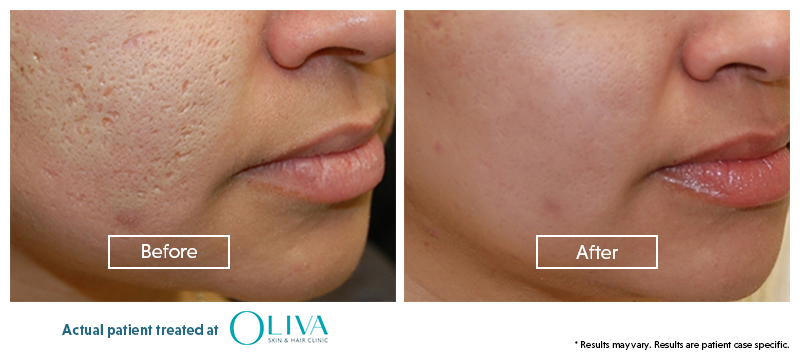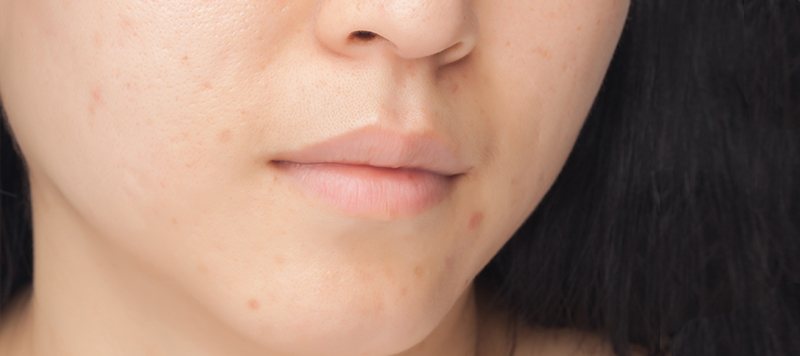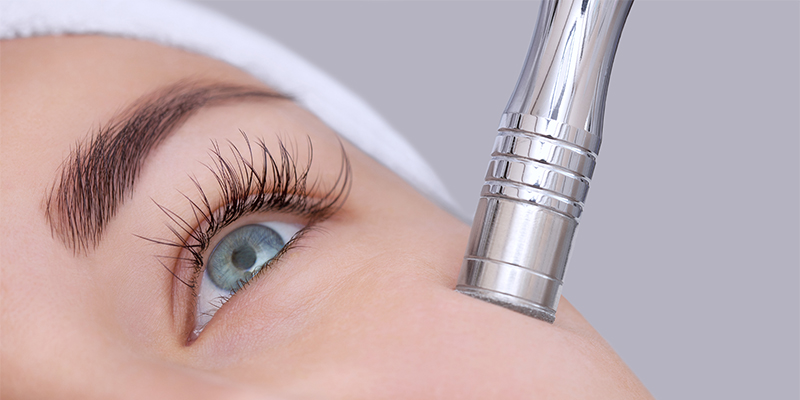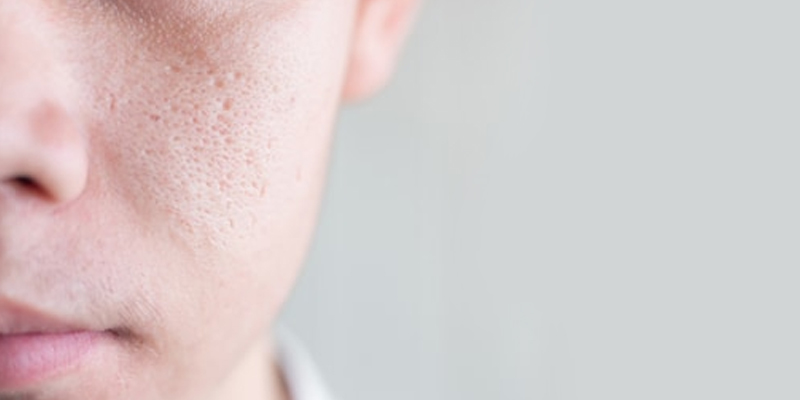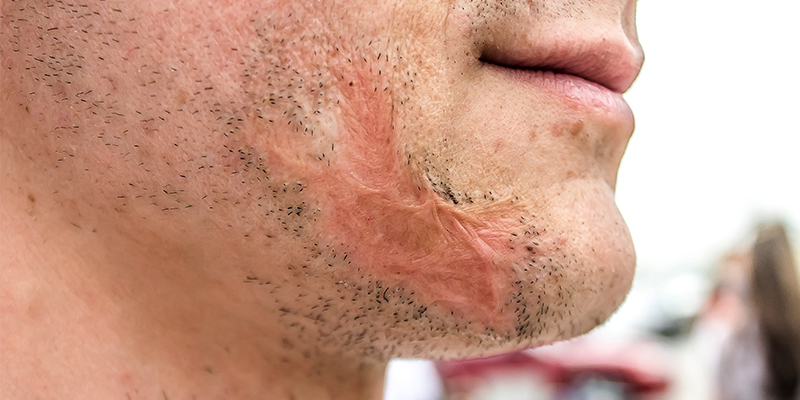Chemical Peel For Acne Scars: Cost, Benefits, Procedure & Results
Chemical peels are medico-aesthetic procedures that help reduce the appearance of acne scars. In this procedure, dermatologists apply a chemical solution to your skin to help exfoliate the outer layers and promote the growth of new, smoother skin with diminished visibility of acne scars. Besides using the chemical peel for scars, dermatologists also find it helpful in managing other skin issues, including uneven skin tone, sun damage, fine lines, and wrinkles. Read more to understand how does chemical peels remove acne scars. We will also learn about the types of chemical peel for acne scars, their benefits, and whether one can use them at home. You will also get an insight into the cost of chemical peel for acne scars, their side effects, and the alternatives for informed decision-making.
Table Of Content
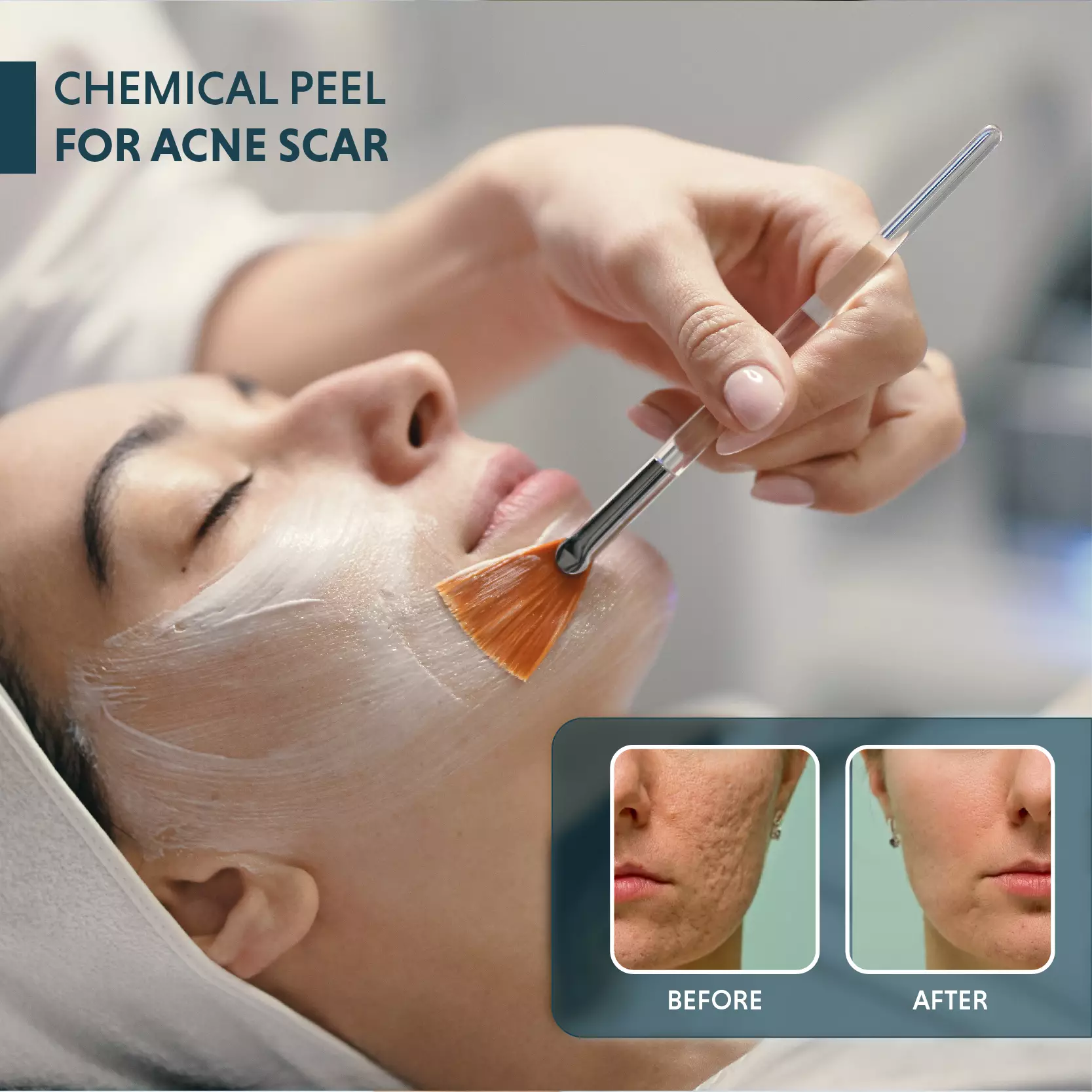
How Does Chemical Peel Remove Acne Scars?
Chemical peels use a chemical solution to improve skin texture and tone and reduce acne scars. When the chemical solution is applied, it exfoliates the skin, and the outer layers peel away. Once the dead skin cells are removed, the natural healing response starts. New skin cells emerge, and the skin looks smoother and has an even tone. This regeneration reduces the appearance of acne scars.
Chemical peels also boost collagen production and improve skin elasticity and firmness. This further makes acne scars less noticeable, resulting in a refined skin texture with diminished scars.
The type of chemical solution to be used and its concentration varies from person to person. However, the most common peeling agents used are glycolic acid, salicylic acid, and trichloroacetic acid (TCA).
NOTE:
Chemical peels are not a ‘one-solution-fits-all’ remedy. Different types of peels work on different skin types and conditions. Some people may also require multiple treatments in combination for more significant improvements. Hence, it is best to consult a dermatologist to understand the most suitable type and strength of peel for your skin needs.
What Are The Different Types Of Chemical Peel For Scars?
If you are wondering which peel is best for acne scar treatment, you must first understand that this decision is best left to the experts. However, there are three different types of chemical peels, which are explained below:
-
Light Chemical Peels:
These are among the most gentle of the peels and only work on the epidermis, the outermost layer of your skin. They are most suitable for the treatment of mild acne scars, fine lines and early wrinkles.
-
Medium Chemical Peels:
These chemical peels penetrate the skin layers and reach the upper dermal layers. They are stronger than light chemical peels, hence, more effective in treating stubborn acne scars. They are also effective against moderate wrinkles and spots caused by sun damage.
-
Deep Chemical Peels:
These are the strongest chemical peels. They go deep into the skin to remove the complete epidermis and some layers of the dermis. They are used primarily to treat deep-running acne and skin scars. However, recovery from these strong peels takes time and carries an increased risk of side effects.
Can Body Areas Can Be Treated with Chemical Peels For Scars?
Yes, apart from using chemical peel for scars on face, you can also try this treatment for other body parts. Chemical peels for back scars and for upper arms are common. Here are some other body areas that dermatologists treat with chemical peels for scars:
- Neck
- Chest
- Shoulders
- Hands
- Legs
- Buttocks
NOTE:
Chemical peels are of different types and in varying intensities. Therefore, it is important to consult expert dermatologists for guidance on which peel will work on which body part.
Best Chemical Peels For Acne Scars
Chemical peels are an effective solution for acne scars. They are often used as a combination of different peels or other skin treatments to reduce acne-related scarring. Here, we will discuss some of the best chemical peels for acne scars:
Salicylic Acid Peels:
These peels are very effective treatments for skin prone to acne eruptions. The salicylic acid (SA) peels enter deep inside the skin pores and dissolve the sebum. This unclogs the pores, reducing acne. It also helps manage whiteheads and blackheads.
- Usually, salicylic acid with 30% strength works for acne.[1]
- This clinic-based treatment requires at least 3-5 sessions spaced 3-4 weeks apart.
Glycolic Acid Peels:
These peels effectively exfoliate the topmost layer of your skin. Glycolic acid (GA) peels promote cell turnover and lend a smoother, more radiant skin tone by removing the outer layer of dead skin cells. In addition to treating acne and acne scars, these peels treat melasma, photo-ageing, post-inflammatory hyperpigmentation, and seborrhoea. They help to reduce excessive melanin and prevent new breakouts.[2]
- If your dermatologist has prescribed glycolic peels as a part of your daily skincare regimen, it will most likely be in lower concentrations of 5% to 15% strength.
- Chemical peeling with stronger glycolic peels of higher concentration between 35% to 70% strength requires a dermatologist’s expert guidance.
- Dermatologists first check your skin for dry patches and open sores, and then recommend the appropriate prepping, following the procedure.
- The treatment usually requires 3-4 sessions spaced three weeks apart.
Lactic Acid Peels:
These peels are gentler than GA and SA peels. They help ease the exfoliation of the skin and boost its hydration. They are often used to enhance the texture of your skin and treat mild acne and resulting scars. Lactic acid peels are effective against melasma and for those with sensitive skin.
- If you use a light lactic acid peel for at-home use, opt for one with 5% to 10% strength.
- Professional, at-clinic treatments usually involve solutions with 50% – 70% strength.
- The lactic acid peel treatment usually requires 4-6 sessions spaced two weeks apart.[3]
TCA (Trichloroacetic Acid) Peels:
These are also medium-depth peels used to treat acne scars and many other severe skin conditions. TCA peel for acne scars work effectively by penetrating deeper into the skin and stimulating collagen production.
- TCA peels are generally used in 10% to 35% concentration.
- It is a uniformly applicable peel with minimum side effects.
Jessner’s Peels:
This chemical peel for scars combines salicylic acid, lactic acid, and resorcinol. It is a medium-depth peel ideal for treating skin with severe acne and scars and is usually well tolerated.
Dermatologists determine the depth of the peel based on the client’s requirements.
Pyruvic Acid Peels:
Pyruvic acid is a powerful peeling agent. It helps build new elastin fibres in the skin and promotes collagen production as well.
- Usually, a 40% to 70% concentration of pyruvic acid peels is used to treat mild acne scars.
- It is used in high concentrations and mostly in clinical procedures only.[4]
Mandelic Acid Peels:
These peels are ideal for sensitive skin as their larger molecular size does not irritate the skin, and dermatologists recommend these peels for those with active acne. It is also effective against post-inflammatory hyperpigmentation.
Combination Peels:
Dermatologists often combine different solutions to create customised chemical peel for scars for their clients to ensure maximum benefits. This approach is usually taken to treat multiple skin issues together. Some skin problems that can be resolved using combination peels are acne, dead skin, clogged pores, and inflamed skin.
Can I Do Chemical Peel For Acne Scars At Home?
There are many over-the-counter chemical peel options available, however, we discourage you from trying them at home as they may lead to side effects and complications. Chemical peels are potent solutions and require expert supervision to avoid skin damage. By using them on your own, you may cause burns, hyperpigmentation, and scarring.
It is important to understand that dermatologists always create chemical peel for scars by understanding client requirements. They look into the skin type, acne condition, and the extent of scarring. OTC peels cannot replace this extent of customisation and hence effectiveness.
Professional supervision also ensures you get the correct post-treatment care for minimum complications. Therefore, to ensure the best results for your skin, always seek professional guidance first.
Benefits Of Chemical Peels For Acne Scars
Here are some of the top benefits of using chemical peel for scars:
-
Improved Skin Texture:
Chemical peel treatment helps get rid of the outer layer of the skin with dead skin cells. As a result, the skin triggers its healing response to produce a smoother and more even skin surface, giving it a healthier appearance.
-
Reduces Acne Scars:
With the dead and damaged skin removed, your acne scars automatically become less visible. The even texture gives way to clearer skin with a renewed glow.
-
Reduces Acne Recurrence By Clearing Pores:
Chemical peels exfoliate the skin and clear out clogged pores. This removes the infected sebum, debris, impurities and any other build-up, reducing the occurrence of acne with every session.
-
Enhanced Collagen Production:
Chemical peels stimulate collagen production [5], which helps improve skin structure and elasticity. As the collagen increases, your skin looks firmer and becomes more resilient to infections, inflammation and damage.
-
Softens Fine Lines:
After you get chemical peel for scars on face there is an increase in cell turnover and collagen synthesis. This softens the appearance of fine lines and wrinkles as the skin becomes refreshed and plump.
-
Minimises Sun Damage:
Peels can reduce sunspots and hyperpigmentation caused by UV exposure, resulting in a more even skin tone. This helps reduce the visible effects of sun damage.
-
Brightens Pigment:
The exfoliation due to chemical peeling helps lighten dark spots and evenly distributes the melanin5. This improves the overall skin brightness, leaving you looking younger and radiant.
Chemical Peels Procedure For Acne Scars
The chemical peel procedure for acne scars involves pre-treatment preparation along with precautions to be taken post the treatment to ensure the best results.
Your dermatologist will guide you through the process.
How To Prepare For The Procedure:
Before the procedure, your dermatologist will ask you to do the following:
- You can maintain your regular skincare routine, but stop using retinol-based products at least a week before the treatment.
- Avoid using chemical-based applications on the skin to prevent allergies and sensitivity.
- Do not get waxing done before the chemical peel.
How Dermatologists Perform The Procedure:
Here is what happens during the procedure:
- The dermatologist starts by thoroughly cleansing your skin to remove any oils, dirt, and makeup.
- Then, they apply a protective ointment on the sensitive areas around the eyes and mouth.
- Then comes the chemical peel solution, which they apply evenly to the targeted areas of the skin with the help of a brush, cotton pad, or an applicator.
- The medical team leaves it on your skin for a certain time.
- You may feel a slight burning or stinging sensation, which is normal.
- Once the required time is over, the team will neutralise the peel and remove it.
- As the last step, the dermatologist will apply a soothing ointment or moisturiser to calm your skin.
What To Expect After The Procedure:
Every client has a different experience after the procedure. However, some things most people notice include:
- Your skin will feel sensitive and appear red for a few days or weeks
- Peeling and flaking of old skin cells that reveal new skin
- Depending upon your peel type, your doctor may suggest follow-ups
- They will prescribe a mild lotion to keep your skin hydrated and soft
- You must avoid sun exposure and protect your skin with a sunscreen
- Your dermatologist will also suggest a customised skin care routine based on your skin type and condition
How Much Do Chemical Peels For Acne Scars Cost In India?
The chemical peels for acne scar treatment cost in India is anywhere between INR 2500/- per session and INR 20000/- per session. This variation in cost is due to several factors. Some of these are listed below:
- Skin condition, type and severity of the acne scars
- Type of peel to be used – light, medium or deep
- Number of sessions required
- The city where your skincare clinic is located
- Technology at the clinic
- Expertise and experience of the dermatologist
DISCLAIMER:
Please note that the prices mentioned are indicative and may vary depending on the specific treatment, choice of technology, and underlying skin or hair conditions. Prices are also subject to change based on ongoing promotions or offers at the clinic. For an accurate estimate, please consult with our dermatologist.
Before & After Results
Before & After Results Of Chemical Peels For Acne Scars
Take a look at the transformative chemical peel for acne scars before and after pictures. These images clearly show significant improvements in skin texture, clarity and the reduction of acne scars.
Side Effects Of Chemical Peels For Acne Scars
Even though chemical peels for acne scars treatment are quite effective, they do sometimes come with certain side effects. Especially when there is no experienced dermatologist involved in the process. Further, never try this treatment at home using OTC options.
Some side effects include mild allergic reactions, irritation, scarring, and infection. There could also be hyperpigmentation (skin may get darker than usual) or hypopigmentation (skin may get lighter than usual).
Besides these side effects, you may see some crusting, redness and swelling of the skin during the first few days after treatment. Make sure you do not scratch or pick the skin to avoid scarring during this healing phase. In some people, the skin remains flaky and continues to peel for up to two weeks. This is normal and subsides on its own.
NOTE:
Different people may experience different side effects and therefore, it is best to consult your dermatologist to understand what you are experiencing and how to manage it.
Alternatives to Chemical Peels for Acne Scars:
There are several alternative treatments for acne scars. Here are some of them:
Microneedling:
This procedure involves using fine needles to create tiny punctures in the skin as it stimulates collagen production and triggers the skin’s healing mechanism. Microneedling helps improve skin texture and reduces the depth of the scars. The procedure has minimal downtime.
Laser Resurfacing:
Laser resurfacing uses concentrated light beams to remove damaged skin layers and boost collagen production. It is helpful in effectively reducing acne scars with far better results than chemical peels.
Dermal Fillers:
Dermal fillers are mostly of hyaluronic acid that dermatologists inject into depressed scars to lift and smoothen the skin. You can find immediate results with this treatment, but the effects are temporary and only last a few months.
Scar Excision:
This is a surgical procedure done to remove individual acne scars. It is usually suggested in cases of severe scars and is often used with other treatment options for best results.
Microdermabrasion:
This treatment option uses an exfoliation device to remove the outer skin layer, reducing mild acne scars. If you have to look at microdermabrasion vs chemical peel for acne scars, the former is a less invasive procedure with a shorter recovery time. However, it may not be as effective for deeper scars.
Frequently Asked Questions
Anyone with mild to moderate acne scars can benefit from chemical peels. However, it is best to consult a dermatologist for a skin examination to confirm its suitability.
People with active skin infections, open wounds, and chronic skin conditions like eczema or psoriasis should avoid chemical peels. Also, peels are not effective on skin types prone to excessive pigmentation or deep wrinkles and sagging skin. Pregnant or nursing women should also consult a doctor before opting for chemical peels.
Depending upon the type of chemical peel, the recovery time is as follows:
- A light chemical peel takes 3- 7 days to heal.
- A medium chemical peel takes 7-14 days to heal.
- A deep chemical peel takes 14-21 days to heal.[6]
Chemical peels may be helpful in removing mild scarring permanently. However, the deeper scars may lighten but are likely to remain.
The most commonly recommended chemical peels for acne scars treatments are glycolic acid, salicylic acid, and trichloroacetic acid (TCA) peels. However, the choice will still depend upon the severity of the condition, your skin type, and the professional recommendation.
The number of sessions required for chemical peel treatment for acne scar removal depends upon the type of peel your dermatologist prescribes. Usually, this treatment requires 6-8 sessions spaced 3-4 weeks apart.
When we measure the worth in terms of the efficacy of the treatment to reduce acne scars, the chemical peel for acne scars cost is worth every penny spent.
Light and medium chemical peels are not painful; they only cause mild discomfort, such as a stinging or burning sensation. However, deep peels can be painful and require local anaesthesia or sedation. You need not worry about this when an experienced dermatologist is involved.
This depends entirely on the type and severity of the scars. Laser treatments can be more precise and effective for deeper scars and offer great results in fewer sessions. Laser is a more expensive treatment with a longer recovery time.
History




